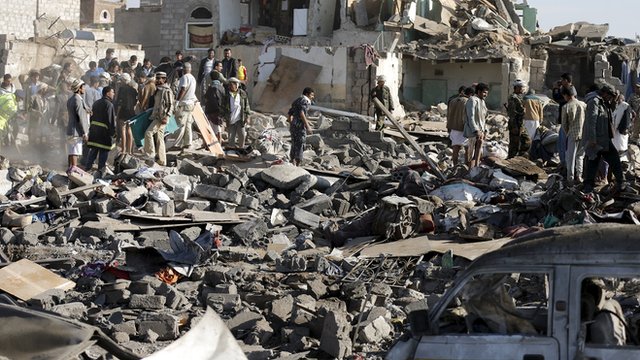

Saudi Arabian bombs kill Yemeni civilians.
Another Shiite mosque was bombed in Sunni-dominated Saudi Arabia on May 29, as Saudi airstrikes continued against Yemen.
The war in Yemen is over whether the people of that country, the most underdeveloped in the region, can achieve and maintain their right to self-determination and sovereignty.
The fighting began after the Ansurallah, also known as the Houthis, rebelled against the regime of Yemeni President Abd-Rabbu Hadi in late March. Hadi left the country and sought support from the monarchy of Saudi Arabia and the generals now running Egypt, both of whom are major U.S. military clients in the region.
U.S. government designs to control the Yemeni people, along with their land and waterways, have been a focus of Washington and Wall Street for many years. The withdrawal from Yemen in March of Pentagon Special Forces and State Department personnel preceded aggressive military actions on the part of the Saudi Arabian and Gulf Cooperation Council regimes, which take their foreign policy initiative from imperialism.
Clashes intensify war for control
On May 31, aircraft from the Saudi-GCC alliance struck Yemeni positions throughout the country, according to people on the ground. Aerial bombardments hit what was said to have been an air base near Sanaa airport and a military outpost supposedly working with the Ansurallah.
The Yemeni television network al-Masira, which is allied with the Houthi movement, said the Saudi-GCC coalition carried out 25 bombing missions in the northwest provinces of Saada and Hajja, very close to the border with Saudi Arabia. Additional reports said Saudi ground forces were shelling the same areas.
People living in Saada told Reuters press agency May 31 that territory held by the Ansurallah was bombed intensively by war planes.
There were also renewed heavy artillery clashes along Yemen’s border with Saudi Arabia, as the war entered an even more deadly and protracted phase.
In the central Yemeni city of Taiz, which has been a major center of armed struggle between the Saudi-backed Hadi militias and the Ansurallah, Saudi-led air strikes on these forces were centered on a mountaintop area and a nearby Special Forces base.
There are claims that during the month of April, Saudi-GCC war planes used cluster bombs in the region of Saada. Human Rights Watch asserted on May 31 that these weapons, which are controversial and banned in various countries, were used against civilian populations. According to a statement issued by HRW senior researcher Ole Solvang, “These weapons can’t distinguish military targets from civilians, and their unexploded sub-munitions threaten civilians, especially children, even long after the fighting.”
Saudi government officials did not respond to these allegations.
Earlier, on May 27, an estimated 40 people, the majority civilians, were reported killed during fighting between Ansurallah and Saudi military units along the border. Local fighters working with the Houthis have been engaging Saudi ground forces in the area and also taking the war into the Saudi kingdom.
One resident told Reuters on May 27, “Houthi gunmen were attacking Saudi border positions from this area, but the coalition’s planes have not hit the Ansurallah and bombed civilians (instead).”
It was also reported by the state news agency Saba on May 27 that Saudi-GCC air strikes on a Yemeni Special Forces base took place against allies of the Ansurallah in central Sanaa: “Around 40 people were martyred and more than 100 others were wounded, according to a preliminary toll, in the bombing operations executed by the Saudi aggression’s planes on the Sabaaeen area in the capital Sanaa today.”
The Red Sea port city of Hodeida, which contains a naval base, was also hit on the same day by Saudi-GCC bombers. According to the same Reuters report: “The naval base was bombed by aircraft and ships. Large parts of it were destroyed and two warships were hit, and one of them, named the Bilqis, was destroyed and sank onto its side, and five gunboats shelled the administrative buildings of the base.”
U.S., Saudi-GCC seek to contain Iranian influence
Saudi Arabia is a theocratic monarchy in which Sunni Islam is the official state religion. Bombings have continued against Shiite mosques in eastern Saudi Arabia. On May 29 during prayers a car bomb exploded at the entrance to one such mosque in Dammam.
News reports said the bombing of the al-Anoud mosque resulted in 21 people killed and 120 others injured, in what is described as the most violent of such attacks in Saudi Arabia in years. Just one week earlier, a similar attack took place in Qatif.
For over two months, the Pentagon and the CIA have been supplying war materials and reconnaissance information to the Saudi-GCC forces in their bombing and ground campaign against Yemen.
The U.S. and its Saudi-GCC allies view the war as an effort to contain and lessen the influence of the Islamic Republic of Iran in the Arabian Peninsula.
While Washington has been participating in talks with Tehran over its nuclear program, the administration of President Barack Obama has not altered the decades-long U.S. hostility toward Iran since its revolution of 1979. That revolution toppled the regime of Shah Reza Pahlevi, who owed his position to U.S. and British oil companies that put him in power in 1953 through a CIA-directed coup.
The following are highlights from a speech given by Yemen’s Ansarallah Commander Sayyed Abdul-Malik Badr…
Panamá Beluche is a sociologist, professor and anti-imperialist organizer in Panamá, writing here about the…
Download the PDF Farmworkers organize three-day strike Palestinian factions demand an end to the famine…
In the more than 650 days since the Al-Aqsa Flood (October 7, 2023), a remarkable…
Special to Workers World Hosted by Panda Aid (China) and co-organized by the International Action…
The following statement summaries were posted July 18, 2025, on Resistance News Network. Palestinian factions…